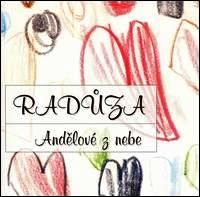Andelove n Nebe
Raduza
℗ 2001 Indies Records 132

World music is full of artists who know how to blend the East and the West — African popsters who have been influenced by soul, funk, and jazz, contemporary Polish artists with a strong Chic/Nile Rodgers/disco influence, Vietnamese easy listening/adult contemporary singers who are into Celine Dion but sing in their own language. In some cases, the East/West blend ends up being more West than East — or vice versa — but on Raduza's promising debut album, Andelove Z Nebe, one hears an approach that integrates the East and the West as effectively as it integrates the past and the present (at least the present as of 2000 and 2001 — when the CD was recorded). Raduza's music is best described as Czech folk-rock; Andelove Z Nebe isn't as an album of traditional Czech folk, although it is quite mindful of the folk traditions of the Czech Republic and other places in Eastern Europe. No one will think that Andelove Z Nebe was recorded in the '20s or '30s — there is way too much rock influence for that — but there is no doubt that Raduza's roots run deep. Like neo-klezmer clarinetist David Krakauer, Raduza has come up with something that is fresh-sounding, modern, and experimental yet is firmly grounded in centuries-old traditions. Occasionally, Andelove Z Nebe sounds a bit more old-school than modern — sort of like a fusion bassist who decreases the Jaco Pastorius/Stanley Clarke factor for several minutes, picks up the acoustic bass, and simply enjoys the pleasures of a Milt Hinton-style groove. But Andelove Z Nebe, taken as a whole, certainly isn't an exercise in old-school East European thinking — this is cutting-edge music that learns and benefits from the past without being enslaved by it. — Alex Henderson. |
- 1. Cestou do Jenkovic [02:52]
- 2. Dnes v Noci nad Svety [03:20]
- 3. Sedim Tise [04:24]
- 4. Co Me to Boli [02:53]
- 5. Autobus [03:33]
- 6. Sviti Slunko, Sviti [03:20]
- 7. Bila Hlina [02:53]
- 8. Rano [01:52]
- 9. Do Afriky [02:28]
- 10. Stoji Kamen, Stoji [03:16]
- 11. Nahoru, Dolu [02:34]
- 12. Leden, je Leden [03:37]
- 13. Lisak [03:11]
- 14. Jednou to Pomine [05:00]
- 15. Tracyho Tygr [03:22]
- 16. Andelove z Nebe [02:03]